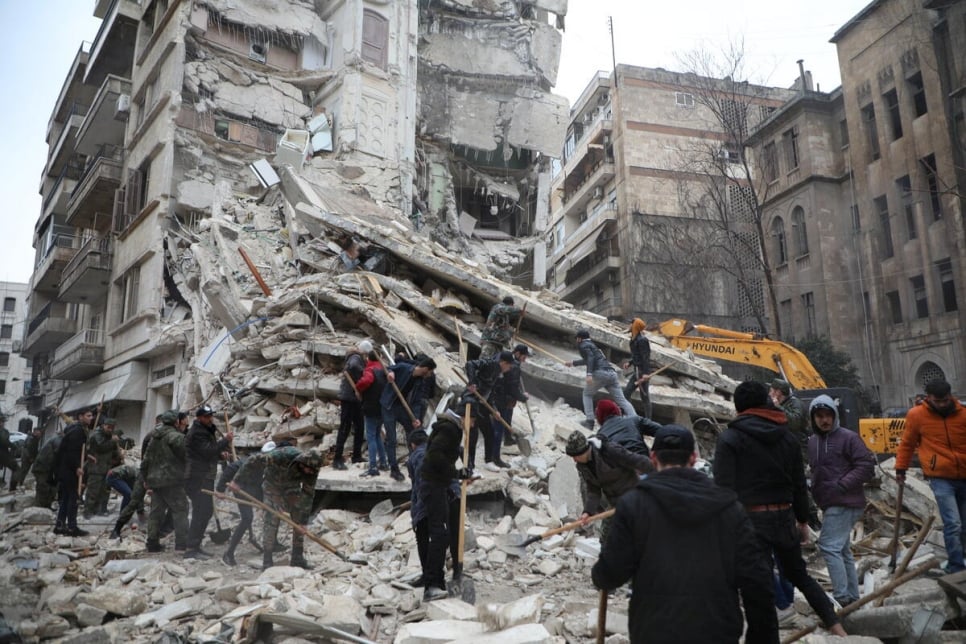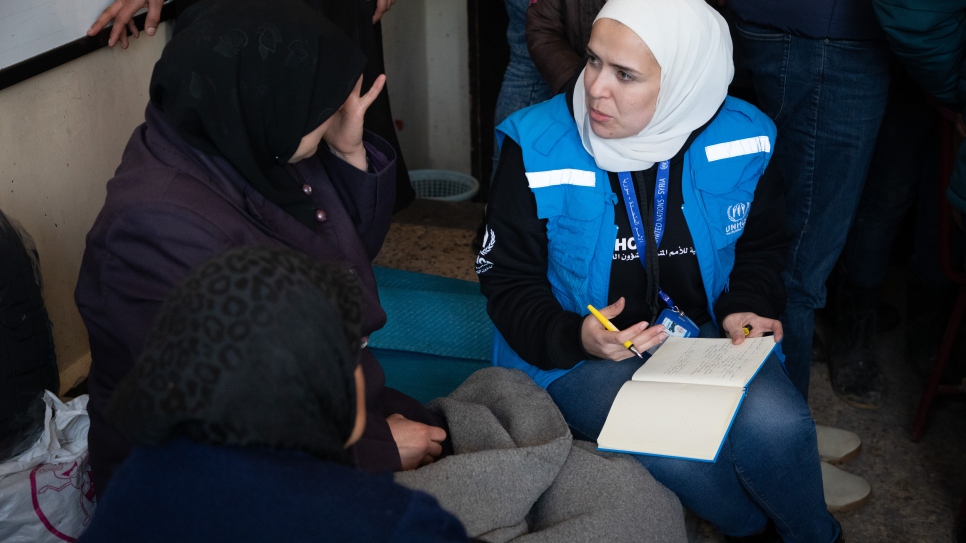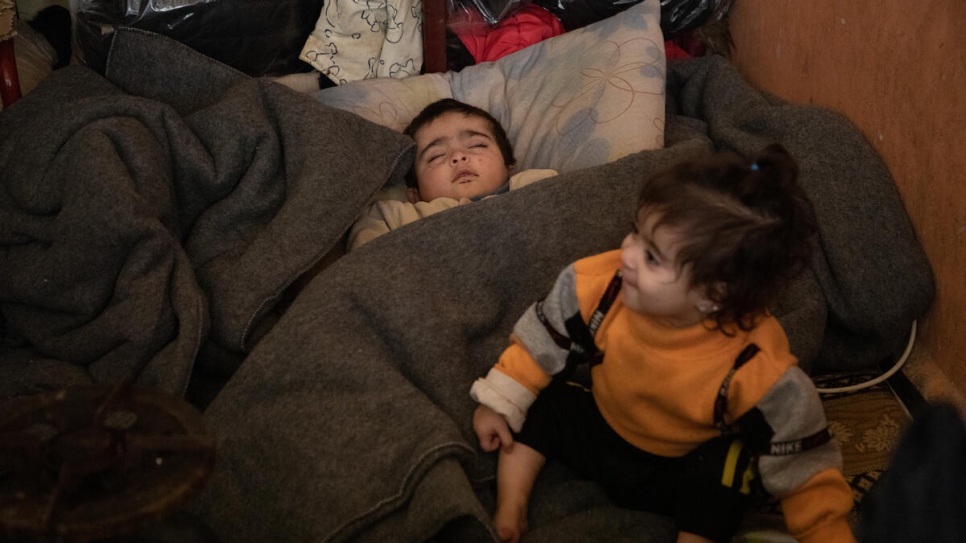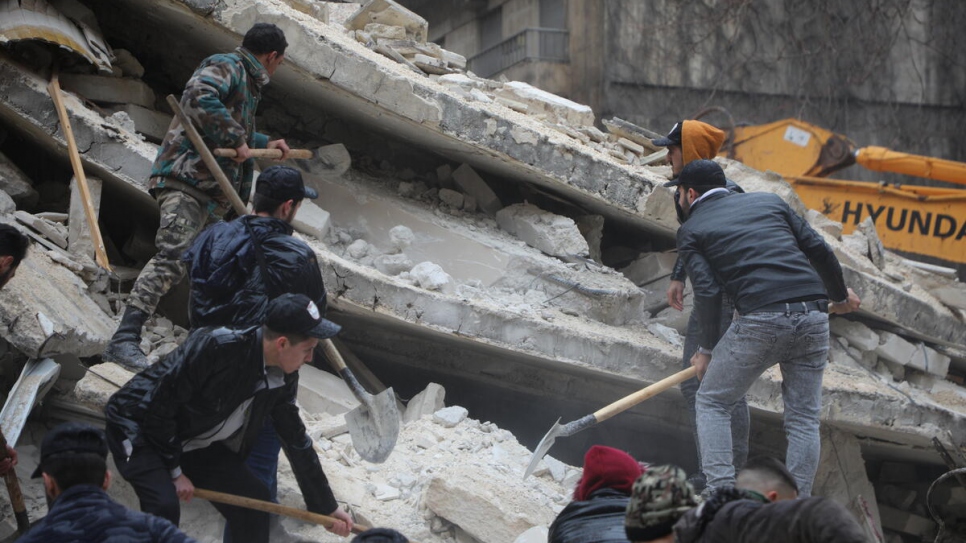UNHCR responds to deadly earthquakes in Türkiye and Syria
Teams from the UN Refugee Agency are on the ground to provide life-saving assistance to families affected by the disaster.

Rescue teams search for survivors in the ruins of a building in the Al-Aziziyeh neighborhood of Aleppo, Syria, where those affected include families already displaced by the country's long-running crisis. © UNHCR/Hameed Maarouf
Two powerful earthquakes that struck south-eastern Türkiye and northern Syria on 6 February have claimed thousands of lives and caused untold destruction to homes and infrastructure across the region.
Among those affected inside Syria are families that were already displaced from their homes by the country’s long-running crisis, living in tents, flimsy shelters and partially destroyed buildings.
In Türkiye, those caught up in the disaster include many thousands of refugees from Syria and the communities that have generously hosted them for nearly 12 years.
With severe winter storms currently sweeping through the region and compounding the vulnerability of survivors, families urgently need life-saving shelter and assistance. UNHCR is already on the ground in Syria providing emergency supplies including tents, thermal blankets, winter clothes mattresses and other supplies.
However, in the northwest of Syria, the combination of the earthquake and a severe snowstorm have damaged or blocked many roads, causing power outages and disruptions to telecommunications networks and hampering the relief efforts.
Humanitarian partners on the ground are working hard to reach all affected areas with much-needed assistance amidst challenging circumstances. One of the main roads used to truck aid to northwestern Syria was damaged in the earthquake on the Turkish side, making it difficult to bring in new supplies. Humanitarian agencies are hopeful it will be repaired within 48 hours.
In the meantime, partners on the ground are using stocks of aid that were prepositioned inside northwest Syria before the earthquake to reach some of those affected and in need of urgent relief.
Another obstacle is the fact that the Turkish city of Gaziantep, near the epicentre of the earthquake, was the main supply hub for the UN agencies and NGOs that oversaw the flow of aid into northwest Syria. Many of their offices were destroyed or damaged in the quake, as well as the homes of some of the staff, who are now working from their vehicles or in open spaces.
In Türkiye, UNHCR teams are assisting refugee and local populations alike in response to the government’s request to provide emergency assistance.
“The situation is tragic,” said UNHCR Representative in Türkiye, Philippe Leclerc. “Right now, UNHCR is providing, with other UN agencies, what the Turkish authorities are requesting, so basically kitchen sets, mattresses, tents, so that we can complement the leading efforts of the Turkish authorities to rescue Turkish citizens and refugees in the same manner.”
At a news briefing in Geneva on Tuesday, UNHCR spokesperson Matthew Saltmarsh described the disaster as a "hammer blow" for displaced Syrians, millions of whom were already reliant on humanitarian aid for survival before the earthquakes struck.
"The refugees and those who have been displaced within Syria itself are already suffering from an economic crisis. We're in the depths of winter. We've been seeing snowstorms. And of course, you know, the war has been going on for over a decade within Syria itself," he said.
"In terms of UNHCR response in [Syria], we've been mobilizing our staff and our stockpiles from our country offices and our regional offices to get much-needed support to the field, to the areas that have been hammered by this earthquake."





